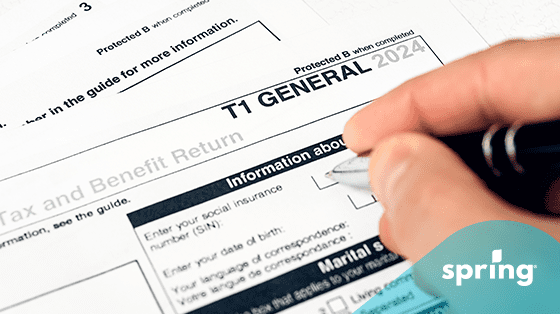Estate Taxes
When someone dies, and there is a will, the executor is there to deal with their estate. The estate consists of the total monetary value of all of the belongings and assets of that individual. This includes everything from investments to personal property and even real estate. But before any inheritances can be distributed, the executor has to file a final tax return for the deceased. This will show if the deceased owes any money, that the estate will pay taxes owed to the CRA, or if there is a refund that will be added to the estate. During this process, an adjusted cost base for the property will be calculated. Any remaining funds after the taxes payable are paid will then be paid out at the same time as distributing assets. Any unpaid taxes, or if the deceased owe taxes from previous years, can cause delays in the process.
When it comes to the assets in the estate, the CRA considers that they were sold at fair market value at the time of death. This is referred to as deemed disposition. The estate is then taxed on that amount for each item. Because things are taxed differently, each item is assessed differently. Keep in mind that this part of the estate taxes applies when the executor or a common-law partner. In that instance, it works a little differently.
How Assets Are Taxed
As mentioned above, all assets are taxed differently. If the deceased had an RRSP on an RRIF, personal income tax will be charged to the estate. There are no special circumstances for capital gains from these for income tax purposes.
Any capital gains tax from the deceased will be charged on using 1/2 or ⅔ based on which capital gains tax applies and the deceased’s personal income tax rate. These capital gains would come from capital assets, also known as capital property, such as stocks, rental property, investment properties, investments or anything else in the deceased’s estate that is considered to be a non-registered capital asset. These things were considered to be sold by the CRA and the taxes would be charged on the fair market value. This significant tax burden is paid by the deceased’s estate.
When filing these taxes, there are so many things to consider, like the amount of income earned during that tax year, lifetime capital gains exemption, Canadian tax laws, and so much more. You may need help from a tax professional or a CPA (certified professional accountant) to ensure that you pay capital gain taxes and any other taxes correctly. You also want to avoid being held liable for anything owed at a later date.
When it comes to foreign inheritances, the way they’re taxed is based on foreign inheritance tax rules. Each country has their own tax rules when it comes to inheritance. This could change what your tax liabilities are on your inherited property as well as your inherited assets.
Inheriting from a Spouse or Common Law Partner
As we mentioned above, estate taxes work a little differently when it comes to inheriting from a spouse or common-law partner. All of the assets such as real estate, RRSPs, mutual funds, and investments are going to be taxed a little differently so the estate tax is likely going to be a lot less. This is of course, if you are a Canadian resident.
How it works as the surviving spouse is that, as long as the inheritance is finished within 36 months of passing, you will then have these assets transferred in your name. Their value will be considered as the fair market value held at the time of death.
Being a spouse or a financially dependent child (qualified survivor) is the only exception to the assets being considered sold off in the estate.
Avoiding Estate Taxes
As you can see, estate taxes can be quite hefty depending on how much the assets of the estate are worth. That being said, there are things that you can do to limit these taxes, called tax efficient transfers, for those you plan to leave an inheritance to.
- Plan any withdrawals. Once you are in retirement, you can avoid taxes on your estate by withdrawing from your RRSP/RRIF first and limiting any withdrawals from your TFSA. This will leave the majority of your money tax-free.
- Life insurance. Having permanent life insurance will ensure that your taxes will be paid upon your death. You can directly set it up this way so the tax money won’t have to come from anything you are leaving as an inheritance.
- Corporation plans. If you have a corporation, it is important to have a plan in place for when you pass away. While there isn’t much you can do to mitigate the taxes, you can verify that there is something in place to deal with all of the shares and assets.
- Primary residence. When it comes to capital gains taxes, those are only paid on properties that are not considered to be your primary residence. This is known as the principal residence exemption and can offer tax benefits. If you make the most valuable property your primary residence then less capital gains tax will need to be paid. Some people also choose to sell these assets as well and leave the money as the inheritance instead.
Gaining an Inheritance as a Non-resident of Canada
Getting an inheritance as a non-resident of Canada is different from receiving an inheritance as a non-resident. We discuss above that Canadian residents are not required to pay a tax on their inheritance. However, taxes are paid through the estate.
A non-resident of Canada receiving an inheritance is the only no inheritance tax exemption. Even then, the executor will hold 25% as a withholding tax before giving the money to the non-resident heir. They must pay that amount to the CRA by the 15th of the month after the inheritance is distributed to the non-resident. This taxed amount could be less than 25% depending on if there is a tax treaty in effect in the country where the non-resident heir lives.
How Inheritance Works in Different Canadian Provinces
While there is no inheritance tax in Canada, are there taxes in relation to the deceased that are required to be paid? Well, the answer is yes. There is a probate tax that needs to be paid, and the amount of tax varies depending on what province you live in and what the estate is worth. This is because the probate is a provincial tax, unlike the estate tax, which is federal. In most cases, the tax implications affect the estate’s assets and the deceased’s final tax return. Once the inheritance money has been paid to Canadian beneficiaries then it’s no longer taxable. This works the same with any death benefit paid. There’s no inheritance taxable after it’s been paid out.
BC Probate Tax
BC’s probate tax ranges between 0.06% and 1.4% of the estates worth. There is also a filing fee of $200 that may occur. The final total though, depends on the amount the estate is worth.
If the estate is with less than $25,000 then there is no tax or filing fee required. If the estate’s worth ranges between $25,000 and $50,000 then the tax rate is 0.06%. If the value of the estate is $50,000 or more than the tax will be 1.4%.
For example: If an estate is worth $300,000 then you would pay no tax on the first $25,000. You would pay 0.06% on the next $25,000. That would leave the remaining $250,000 to be charged at a rate of 1.4%.
0 X 25000 = 0
0.006 X 50000 = $150.00
0.014 X 250000 = $3,500
Total Taxes = $3,650
Alberta Probate Tax
Alberta has different probate fees than BC. They are actually considered to have the lowest rebate taxes in the country. The maximum they will charge is $525.
- If the estate is worth $10,000 or less, then the probate tax would be $35.
- For estates between $10,00 and $25,000, the tax is $135. For $25,000 to $125,000, the fee is $275.
- For $125,000 to $250,000, the tax is $400. Any estate worth $250,000 or more, the tax is $525.
Ontario Probate Tax
Ontario probate fees are calculated much differently than those of BC or Alberta. The first $50,000 of the estate is tax-free, and after that, the fee is $15 for every $1000 of the estate’s worth. That being said, even if the estate is valued under $50,000, you still need to file an Estate Information Return within 180 days.
If you are looking at what the fees would be on a $300,000 estate, you can see how different the province’s fees are.
300,000 – 50,000 = 250,000
250000/1000 = 250
250 x 15 = 3,750
Total taxes = $3,750
What is Probate?
The definition of probate is the general administration of a will or an estate without a will. If there is a will, the executor will handle this process, which can make the estate settlement process faster. The executor is responsible for filing the will with the probate court and starting the probate process. How long an estate is in probate depends on whether the will is contested or not. It can also take longer if there is no will.
In some cases, probate is required. It really depends on the worth of the estate and other particulars of the will. Usually, probate is required if there are assets involved in the estate. If there’s an executor, this person is chosen during the estate planning process.
Inheritance and Income
Because there are no direct inheritance taxes, it is not considered an income, according to the Canada Revenue Agency. So, no matter who you inherit any money from, you will not have to pay any taxes. That being said, the executor still has to impose estate taxes as well as pay provincial probate taxes and federal taxes before you even get the money. The inheritance itself isn’t considered part of your taxable income and doesn’t fall as part of your individual tax obligations.
Inheritance From Your Parents
When it comes to receiving an inheritance from your parents, it works the same way as any other type of inheritance. The primary residence (your parent’s home) isn’t subject to estate taxes, but any other properties are. You will have to file their final income tax return and then pay any required taxes out of the estate. Your actual inheritance cannot be taxed.
When it comes to Registered Retirement Income Funds, the tax isn’t paid once you receive your inheritance. All taxes are paid by the person from whom you inherited the RRIF based on their marginal tax rate on the deceased’s final tax return. Anything after that that you receive won’t be taxed based on the Canadian Inheritance Tax Laws. This is the same for other registered investments you may inherit as well.
Getting an Inheritance in Canada
Overall, if you are just an heir in a will who receives an inheritance, there are no taxes in Canada that need to be paid. Even if you are a non-resident of Canada, the executor handles the taxes you need to pay before you even receive your inheritance. All other taxes will be paid to the CRA before the will is distributed. Because this money is an inheritance, you also do not have to claim it on your income taxes. That being said, if you are an executor of a will as well as an heir, then you will have to deal with everything. You may even need to consult a lawyer if the process is complex, but most estates are quite straightforward to deal with.








